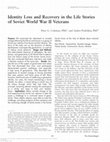Accounting by Peter Coleman
Papers by Peter Coleman
This research investigated the relationship of implicit theories of organizational power with per... more This research investigated the relationship of implicit theories of organizational power with perceptions of manager/employee interdependence and a willingness to share power with others. It tested the theory that differences in two distinct organizational power theories--the belief that organizational power is a scarce resource vs. an expandable resource--would predict competitive vs. cooperative orientations between managers and employees and affect managers' willingness to share information and offer support. An experiment is presented in which limited or expandable implicit power theories were induced. The study found that participants primed with limited-power theories viewed their relations with employees as more competitive, and shared fewer organizational resources than those primed with expandable-power theories.

The scheme briefly delineated here is an attempt to solve three important personnel problems in s... more The scheme briefly delineated here is an attempt to solve three important personnel problems in school district administration. How does one (1) evaluate administrators in a decentralized system: (2) clarify and reconcile personal and organizational goals to achieve accountability; and (3) provide detailed feedback on the consequences of administrative behavior in order to encourage change in ineffective behavior. The scheme depends on careful delineation of system goals, and on the annual development of written statements of personal goals by administrators. These are guided by agreement on major functions and by system goals. The statements must provide criteria for measuring achievement. They are discussed in planning sessions and refined and revised until acceptable both to the administrator concerned and the school district representative. The initial implementation revealed some practical difficulties, but more importantly suggested that theories that define organizations as goal-oriented systems are incomplete. Exchange cr cooperation-based theories seem to be essential adjuncts. The scheme seems to have some utility. At the very least, it may help administrators drowning in a sea of trivia to identify some high priority activities and allocate their time and effort more rationally than at present. (Author+ U S DE PANTMENT OF NEAL TH EOUCAT.ON Al WELFARE NATIONAL iNST ITU TE OF EDUCATION ,t .. r-fr rf, f' r 'rf .t r.r

Purpose: We examined the adjustment to societal change following the fall of communism in a group... more Purpose: We examined the adjustment to societal change following the fall of communism in a group of Soviet war veterans from Russia and the Ukraine. The focus of the study was on the dynamics of identity development, and especially generativity, in a period of intense social upheaval. Design and Methods: We administered measures of self-esteem, life satisfaction, and generativity to 50 World War II veterans from five distinct areas of the former Soviet Union. We also conducted life-history interviews and made a thematic analysis of the transcripts. Results: Despite the loss of the system of government and values that had dominated their lives, most participants demonstrated positive well-being, and especially a high sense of generativity. They described their experience of societal change as having disturbed their past, present, and future sense of self. Most, however, had found ways of reaffirming a generative identity. For some, this meant maintaining a Soviet identity; for others, it meant taking a critical view of the history through which they had lived. The principal sustaining element among the participants as a whole was hope in their own families' future. Implications: Major societal change of the kind experienced by Soviet war veterans in later life poses a challenge to a continued sense of generativity. These elderly veterans were able to meet this challenge, providing evidence of their resilience and the continuing strength of family bonds in the former Soviet Union at this time of debate about national identity.

Conflict is generally a constructive process, but in a small proportion of cases it can degenerat... more Conflict is generally a constructive process, but in a small proportion of cases it can degenerate into a self-sustaining pattern of negative interpersonal and intergroup relations that seem impervious to change. We conceptualize these seemingly intractable conflicts within a dynamical systems perspective. Intractable conflict develops when a social system loses its complexity and converges on a narrow range of mental and behavioral states-an attractor-and becomes resistant to external influence that might otherwise promote a different set of states. Beyond its manifest attractor, a system may have a latent attractor representing a different set of mental and behavioral states. A latent attractor creates the potential for a rapid, nonlinear change in the relations between individuals or groups-from destructive to benign or vice versa. Beyond providing insight into the nature of intractable conflict, the dynamical perspective offers 3 general strategies for the transformation of such conflict into positive relations. the manifest and latent nature of intergroup relations-their surface appearance versus their underlying potential for shaping thought, feelings, and actions-provides insight into the nature of confl icts that are especially malignant and resistant to resolution. Th is distinction, moreover, may hold the key to how such confl icts can be transformed into relationships that are benign or even positive.
The other day I was taking a walk across the shore of Jaffa [a Palestinian town prior to 1948] an... more The other day I was taking a walk across the shore of Jaffa [a Palestinian town prior to 1948] and I was looking at the houses that now have been converted into these galleries […] They are very nice houses with traditional Arabic Architecture, but I got so upset just looking at them. For someone who did not grow up in the conflict, they are just houses. For me, it is not just a house, it is a house that used to belong to my relatives who, by the way, today live in a refugee camp in the Gaza Strip. I look at the house and it brings up all the history, the injustice, and the emotions. By that time, I can't even stand seeing the face of any Israeli passing by me. It doesn't matter who" (anonymous Palestinian, 2007).
Peace and Conflict Journal of Peace Psychology, 1997
Ageing and Society, Jul 1, 1998
ABSTRACT Survivors of a longitudinal study over the age of years were asked whether they saw t... more ABSTRACT Survivors of a longitudinal study over the age of years were asked whether they saw their lives in terms of story and whether they agreed with our assessment of its present major themes. Two-thirds of the initial sample of people affirmed that their life story was a ...
Journal of Educational Administration, 1973
... Hess and Torney, for instance, suggest that "the conceptualization of government is tied... more ... Hess and Torney, for instance, suggest that "the conceptualization of government is tied to personal figures for young children, then to ... Bruner's "instrumental conceptualism", which is developed out of Piagetian theory, at least in part, is probably the only theory of its kind ...
Http Dx Doi Org 10 1080 13607863 2010 519320, Apr 1, 2011
Physica Status Solidi C Current Topics in Solid State Physics, Sep 1, 2007
This study examines the purpose of the school district structure and the manner in which it refle... more This study examines the purpose of the school district structure and the manner in which it reflects the expectations of citizens for their school system. The document focusses on the community involvement and financial aspects of reorganization and examines (1) the basic pattern of school district reorganization in North America to find some common factors; and (2) the concepts of local control and accountability, as they relate to the notion of community involvement in school districts. Three main sets of criteria are used as organizing principles: educational, financial, and community involvement. The report concludes with some possible reorganization plans for the region under study.

Uploads
Accounting by Peter Coleman
Papers by Peter Coleman